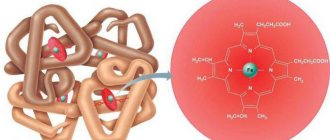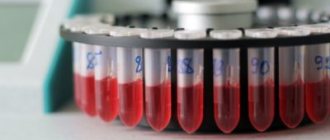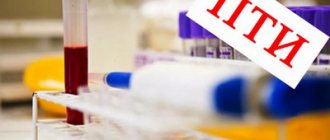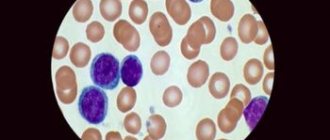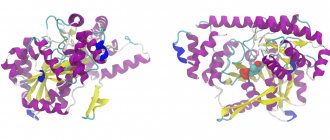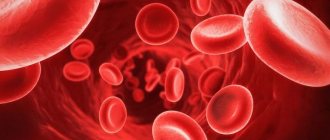Hormones
05/21/201801/24/2019 Yulia Martynovich (Peshkova) 1045 Views hormonal studies, TSH
The test results show elevated TSH, what does this mean in women and how to treat it? Now we'll tell you everything.
High thyrotropin levels are a sign of pituitary or thyroid dysfunction. When establishing the causes of a pathological condition, special attention should be paid to the correct preparation of the patient for the donation of biomaterial.
It is possible to obtain false positive results due to taking medications, emotional or physical fatigue, as well as the wrong time of blood collection. In case of overestimated or underestimated TSH results, excluding the above factors, the doctor determines additional diagnostic methods.
You should understand the main reasons for exceeding the permissible norm of thyroid-stimulating hormone and how to lower TSH in women to normal.
- 1 What is the TSH hormone and why is it needed?
- 2 What is the normal TSH level, and what does it affect?
- 3 Symptoms of elevated TSH
- 4 Causes and consequences of elevated TSH in women
- 5 Why is thyroid-stimulating hormone elevated? Pathological causes
- 6 Consequences
- 7 How to reduce TSH without hormones using folk remedies?
- 8 Diet for elevated TSH
Thyroid-stimulating hormone
TSH is secreted by the anterior pituitary gland, a gland located on the undersurface of the brain. This hormone is one of the most important in the body; it responds to and regulates the functioning of the thyroid gland, and also affects metabolism. When there is a drop in thyroxine or triiodothyronine in the bloodstream for some reason, a natural increase in TSH occurs.
Thyroid-stimulating hormone increases blood supply to the thyroid gland; for this reason, iodine, which is very necessary for the gland to function normally, is better absorbed from the blood. In turn, iodine promotes the formation of thyroglobulin, as well as the hormones T3 - triiodothyronine and T4 - thyroxine.
Thyroid diseases in older women
Among older women, disturbances in the functioning of the thyroid gland are very common, especially with regard to an increase in the level of production of the hormone TSH or deviations from the norm in the production of T3 and T4. According to statistics, the rate of hypothyroidism among people in this group is six percent.
The disease hypothyroidism often takes advanced forms due to the fact that the clinical symptoms are erased, often coincide with senile ailments and do not cause anxiety.
When examined by an endocrinologist, a blood test may show an increase in serum free triiodothyronine (T3), a decrease in total and free thyroxine (T4), and a moderately elevated TSH. Interpretation of the result may be difficult due to the atypical clinical picture, so endocrinologists approach treatment with caution.
The results of T3 and T4 tests are significantly influenced by the iodine preparations and b-blockers taken by the patient.
The main symptoms of hypothyroidism in older women:
- Neuropathy;
- impaired cognitive function;
- violation of social behavior;
- mental disorders;
- depression.
Older patients are susceptible to myxedematous coma, which serves as a diagnostic symptom of a violation of the hormonal levels of TSH, T3 and T4.
Laboratory examinations for the level of hormones T3, T4, TSH are carried out by all patients with weight changes and cardiac dysfunction. Objective examination data, such as palpation, visual inspection and other methods, do not have a high diagnostic value in older people; finding a goiter is difficult and sometimes impossible. The diagnosis of primary hypothyroidism is made based on blood tests showing increases or decreases in TSH, T3 and T4 levels and the production of antibodies to thyroglobulin and thyroid peroxidase.
With a reduced level of T3, T4 and normal TSH, a non-thyroid disease or problems with the pituitary gland and hypothalamus are diagnosed.
Functions in the body
Hormones T3 and T4 control the metabolism of all nutrients in the body (proteins, fats, carbohydrates), in addition, these hormones are responsible for the normal functioning of the reproductive and digestive systems, as well as the circulatory system. Thyroxine and triiodothyronine are also responsible for a person’s mental state. Therefore, it becomes obvious that a lack or, on the contrary, an excess of TSH affects the level of T3 and T4, and therefore the overall health of the human body.
Attention! Thyrotropin is characterized by daily fluctuations in secretion. The highest concentration of TSH in the blood is observed at 2-4 am, it decreases slightly until 6-8 am, the lowest amount of TSH occurs at 17-19 hours.
This is interesting! When awake at night, the normal rhythm of secretion of this hormone is disrupted. Thyrotropin concentrations decrease during pregnancy. Also, with age, TSH becomes slightly higher, and the release of the hormone at night decreases.
When insufficient TSH is produced in the body, it provokes proliferation of thyroid tissue, it increases in size, a disease called goiter.
A change in the content of thyroid-stimulating hormone in the body indicates hormonal disorders.
What is the TSH hormone and why is it needed?
Thyroid-stimulating hormone (TSH) is secreted by the anterior pituitary gland. TSH is one of the main regulators of the hormone-secreting function of the thyroid gland. The launch of this process is accompanied by an enzymatic reaction to convert the ATP molecule (a source of energy) into cAMP (an intercellular molecular signal).
An inverse correlation has been established between thyroid hormones (thyroxine - T3 and triiodothyronine - T4) and TSH. In other words, the more actively T3 and T4 are released, the less the pituitary gland secretes thyrotropin, and vice versa.
The importance of controlling the levels of T3 and T4 in the blood is explained by their functions. These are the main regulators of energy exchange processes. They are also necessary for normal metabolism, the process of growth and development of all tissues of the human body. Therefore, their deficiency or excess negatively affects health.
Main article: All about the concept of TSH and the rules for taking the test
Normal TSH in women
To evaluate the functioning of the thyroid gland, hypothalamus, pituitary gland and check the content of thyroid-stimulating hormone in the blood serum, a laboratory test is performed.
How to prepare for the analysis?
To determine the TSH level, you should take a test. If deviations are detected, you should consult a doctor and begin appropriate treatment. The accuracy of the results obtained depends 60% on the patient’s preparation.
Rules for preparing for TSH analysis:
- the last meal should be at least 8 hours before the visit to the laboratory;
- after consultation with your doctor, you should limit your intake of medications containing iodine and supplements for at least 7-10 days;
- limit emotional experiences within 24 hours, and before donating blood, sit quietly in the laboratory department for 15-20 minutes;
- do not smoke 3 hours before the test and do not drink alcohol 2-3 days before the test;
- The blood test should be taken at 8-9 am.
The immunochemiluminescence method is used for analysis; the period for obtaining results ranges from several hours to 1 day.
Often, along with donating blood for TSH, a specialist may recommend testing for the hormones T3 and T4, since they are interrelated. The amount of these two biologically active substances in the body is inversely proportional to the level of TSH.
In other words, the higher the concentration of T3 and T4, the less thyrotropin is produced. And vice versa - the volume of TSH increases, with a decrease in the amount of T3 and T4. Determining the level of all three hormones allows a specialist to create a more accurate picture for assessing a person’s hormonal levels.
If TSH levels in a woman’s body correspond to the norm, this is an indicator of the healthy functioning of the endocrine system, and vice versa, any deviations from normal levels of the hormone affect many systems of the body.
Normal TSH level in the body
The data provided is intended for a preliminary comparison of standards:
- Newborns - TSH 1.1–17.0 mU/l
- Less than 2.5 months - TSH 0.6–10.0 mU/l
- From 2.5 to 14 months - TSH 0.4–7.0 mU/l
- From 14 months to 5 years - TSH level 0.4–6.0 mU/l
- From 5 to 14 years - TSH 0.4–5.0 mU/l
- From 14 years and older - TSH 0.4–4.0 mU/l
Experts consider such TSH indicators in patients to be only relative, since experts have not come to a consensus on the normal level of the hormone. Such doubts are due to the fact that the levels of this hormone are constantly changing over a 24-hour period. Yes, many other factors also affect the concentration of TSH.
For example, thyroid-stimulating hormone levels can be affected by the presence of bad habits, foods, stress, psycho-emotional experiences and increased stress. That is why blood is taken for analysis exclusively on an empty stomach in the early morning.
What is the normal TSH level, and what does it affect?
The standard rate of thyrotropin is selected for each age. Experts have not identified any fundamental differences in the levels of the hormone in the blood of men and women. However, for a woman, reference (acceptable) values should be selected taking into account the stage of the menstrual cycle or pregnancy.
It is not difficult to decipher the analysis yourself, but you should not try to determine your diagnosis. In differential diagnosis, the doctor relies on the summary data of laboratory and instrumental diagnostic methods, adding up the patient’s complete medical history from them and the clinical picture. The information in this section should be used for informational purposes only.
For newborns up to four months of life, the acceptable norm is considered to be a range from 0.5 to 11 µIU/ml; for the second half of the year, the upper limit of the norm should not exceed 8.5 µIU/ml. The norm for thyrotropin in children from 1 year to 7 years is 0.65 – 6 µIU/ml, then up to 12 years the maximum permissible concentration of the hormone in the blood is 4.8 µIU/ml. The puberty period is accompanied by significant changes in the entire hormonal background, the normal range is from 0.47 to 4.5 μIU/ml.
After 20 years, normal thyrotropin levels should range from 0.35 to 4.2 µIU/ml. If TSH is elevated, the full functioning of the thyroid gland is suppressed and the amount of T3 and T4 in the blood begins to decrease.
Read further: TSH norms in women and children by age, transcripts
Features of the TSH indicator in pregnant women
Without sufficient levels of hormones, the full functioning of the entire body is impossible; this becomes especially important for a woman during pregnancy. This factor determines the importance of conducting a TSH test during pregnancy for every woman.
Norm TSH in pregnant women by trimester
Human chorionic gonadotropin (pregnancy hormone) is similar in chemical structure to TSH. This determines the stimulation of the synthesis of thyroid hormones. In the 1st trimester of pregnancy, the level of thyroid hormones increases, and TSH decreases. Then the thyrotropin value returns to normal limits. Therefore, the norms of the hormones TSH and T4 in pregnant women should be determined taking into account the trimester of pregnancy.
A pregnant woman herself can correctly decipher the results of the study, but only a doctor can establish a specific diagnosis and select the necessary treatment. The risk of self-medication is quite high and can harm not only the expectant mother, but also the developing child. The earlier a hormonal imbalance is detected in a pregnant woman, the easier it is to correct it.
1st trimester of pregnancy, TSH level
Approximate TSH norms during pregnancy in the 1st trimester range from 0.15 to 2.45 mU/l. For comparison: reference values for women over 20 years of age range from 0.4 to 4 mU/l. You should not be upset when you detect low levels in the first weeks of pregnancy. This is considered a variant of the physiological norm and does not pose a danger to the mother and the normal development of the baby.
2nd trimester of pregnancy, TSH level
The normal level of TSH in the blood during pregnancy in the 2nd trimester is 0.18 - 3.2 mU/l. At this stage, the symptoms of toxicosis already disappear in the pregnant woman, and the size of the abdomen does not hinder movements and does not cause discomfort. The expectant mother normally feels a surge of energy and strength. If a woman is worried about apathy, depression, increased sleepiness and frequent mood swings, then the level of thyroid-stimulating hormone should be checked. Exceeding normal values requires immediate selection of treatment.
3rd trimester of pregnancy, TSH level
The third trimester of pregnancy is characterized by even higher normal levels of thyroid-stimulating hormone. However, it should remain below reference values for non-pregnant women. Laboratory values from 0.29 to 3.5 mU/l are considered optimal.
Subclinical hypothyroidism in children
The child's thyroid gland begins to secrete hormones at the twelfth week of intrauterine development. An analysis for increased or decreased TSH is taken immediately after birth, for medical reasons. For the test, blood is taken from the newborn's heel.
Symptoms of subclinical hypothyroidism in newborns:
- Hoarse crying;
- swollen face and eyelids;
- dry skin;
- low body temperature;
- congenital jaundice;
- the baby does not latch on to the breast.
In older children, the disease causes problems with cognitive function, physical development, vision, and psyche.
To treat children, drugs with thyroid hormones are used; the dosage is determined by the endocrinologist after examination.
Hormonal disorders in a child will have to be compensated throughout his life, only in this case his development will be complete.
High TSH level during pregnancy - consequences, danger
If the TSH level is elevated in a pregnant woman, a repeat test is prescribed. This is necessary to clearly exclude the influence of external and internal factors. It is important to retest the TSH hormone during pregnancy at the same time, since its value changes throughout the day.
The optimal time for taking the test is considered to be from 8-9 am. The test should be repeated in the same laboratory, since different departments may use different reagents to measure the value of the laboratory indicator.
A slight deviation from normal values (no more than 5 mU/l) may occur due to increased anxiety or psycho-emotional stress in the pregnant woman being examined. A persistently elevated level of thyrotropin in the blood indicates the following:
- inflammatory process of thyroid tissue;
- severe gestosis (preeclampsia and eclampsia);
- oncology affecting the organs of the endocrine system;
- basophilic pituitary adenomas;
- thyrotropinomas;
- thyroid hormone resistance syndromes;
- hypothyroidism;
- adrenal insufficiency;
- severe somatic pathologies, etc.
An accurate determination of the cause is possible only after an additional examination of the woman using laboratory and instrumental diagnostic methods.
Important: if an elevated level of TSH in the blood is detected, a diagnosis is made to determine the level of thyroid hormones. As a rule, this condition is accompanied by a lack of thyroid hormones from the thyroid gland.
Non-pathological causes include taking medications containing iodine, which provoke false-positive results, as well as taking anticonvulsants, beta-blockers, amiodarone, etc.
Symptoms
An increase in TSH levels means the development of a dangerous complication - hypothyroidism. The first symptoms of increased levels of thyroid-stimulating hormone are decreased appetite due to slower metabolism, chronic fatigue, apathy, lethargy, sleep disturbance, yellowness of the skin, nausea and constipation, deterioration of the condition of nails and hair. A woman may complain of shortness of breath, headaches and dizziness.
An increase in TSH promotes rapid weight gain, which causes obesity. Body temperature is below normal. A prolonged increase in the amount of thyroid-stimulating hormone in a pregnant woman is dangerous with the possibility of miscarriage. Read more about TSH during pregnancy here >>
An increase in TSH promotes rapid weight gain, which causes obesity.
Read more about the causes, symptoms and treatment of elevated TSH here >>
Reduced TSH levels during pregnancy and possible consequences for the fetus
If there is a decreased level of TSH during pregnancy in the first trimester, then the woman should not worry. This condition occurs due to nausea and vomiting resulting from toxicosis. By the 2nd trimester of pregnancy, normal TSH levels are restored, when toxicosis practically disappears.
The danger is when the level of the hormone decreases due to the developing pathology of the endocrine system. In 3%-4% of cases in pregnant women, hyperfunction of the thyroid gland is detected against the background of a decrease in thyroid-stimulating hormone. This causes the tissue to grow and provoke hyperthyroidism.
Hyperthyroidism manifests itself as:
- increased sweating;
- trembling of fingers;
- weight loss even with a normal diet;
- feelings of increased anxiety, emotional lability, frequent mood swings;
- “bulging” eyes due to swelling and proliferation of periorbital tissues;
- rare blinking;
- tachycardia;
- increased blood glucose levels;
- heat tolerance;
- decreased libido;
- loose stools, abdominal pain, etc.
If hyperthyroidism is not treated, miscarriage, premature birth, gestosis can occur, and this also leads to fetal hypoxia and delays in its normal development, damage to the baby’s nervous tissues and liver, asphyxia of the newborn, etc.
You should not be careless about the condition when the TSH value in the test results is reduced. If a pregnant woman wants to maintain her pregnancy, carry and give birth to a healthy child, she must regularly undergo laboratory diagnostics to determine her hormonal status. Most likely, your doctor will recommend giving birth by cesarean section.
During pregnancy
During pregnancy, as a result of changes in hormonal levels, the TSH normal range increases from 0.3 to 5.2 µIU/ml.
In the first trimester, the influence of estrogen and hCG (human chorionic gonadotropin) leads to the fact that a woman produces more T4 and T3 not only for the mother’s body, but also for the fetus, and the concentration of thyroid-stimulating hormone decreases to a minimum level.
After the 12th week, the fetus’s own endocrine system forms and begins to function, which causes a decrease in thyroid hormones and increases the mother’s TSH within the reference values.
| Stages | Norm, µIU/ml |
| Planning | 0,4-2,5 |
| I trimester | 0,3-4,5 |
| II trimester | 0,5-4,6 |
| III trimester | 0,8-5,2 |
An increase in TSH during pregnancy throughout all trimesters above 6 μIU/ml is the result of pathological processes and indicates, first of all, a lack of thyroid hormones necessary for the full development of the nervous and cardiovascular systems of the fetus.
Symptoms of hypothyroidism during pregnancy are often mistaken for manifestations of other diseases, so a TSH test is included in the list of mandatory laboratory tests in the first trimester.
Failure to treat the hormonal imbalance of thyroxine and triiodothyronine during pregnancy can lead to consequences for the woman such as anemia, weakness, congestive heart failure, preeclampsia, postpartum hemorrhage, and for the fetus - intrauterine growth retardation, miscarriage, and premature birth.
Postpartum hypothyroidism is observed in women prone to thyroid dysfunction, while hormonal changes associated with conception and fetal development accelerate the development of the disease.
Risk factors for developing hypothyroidism after childbirth include:
- severe toxicosis in the second and third trimesters;
- type 1 diabetes;
- high titer of antibodies to thyroglobulin or thyroid peroxidase before conception;
- chronic viral hepatitis;
- diseases of the endocrine system in personal and family history;
- iodine deficiency in diet.
Treatment and prevention in pregnant women
Treatment methods for a pregnant woman are selected taking into account the reason that caused the deviation of the laboratory value from the norm. First of all, a comprehensive diagnosis is required, which includes: ultrasound of the thyroid and adrenal glands, determination of hormonal status, tests for tumor markers and autoimmune diseases.
If the level of the substance is insufficient, hormonal therapy is used. There is no need to be afraid of addiction or side effects. Modern medications contain the small required effective dose of hormones to correct the condition.
Preventive measures include regular monitoring of hormonal status and taking medications containing iodine if necessary. Pregnant women need to consume at least 200 mg of iodine per day. You should also take care of your diet and include seaweed, fish and other seafood in your menu.
Why are thyroxine norms violated?
Norms are most often violated among older women, as well as among those who are expecting the birth of a child or those who have recently learned the joy of motherhood. The body of such women carries antibodies. If a woman’s body does not have enough nutrients, then thyroiditis, which occurs in an autoimmune form, is often to blame (this is a disease that affects the thyroid gland and has a hereditary form). This pathology often forms in the body of pregnant women, after childbirth and elderly women.
Hypothyroidism develops in a latent form while it is the initial stage of the primary form of the disease. The reasons for the development of the pathological condition are as follows:
- thyroid tissue is susceptible to disorders;
- the human body lacks iodine content;
- the thyroid gland was subject to surgical intervention;
- When thyroid disease was treated, radioactive iodine therapy was used for a long time.
You need to understand that an increase in hormonal levels is not always directly related to hypothyroidism. The reasons may be:
- adrenal glands suffer from insufficiency;
- before taking the tests, the person drank alcohol;
- when blood sampling is performed, the person was under severe mental or emotional stress. Significant physical stress may also be the cause;
- During pregnancy, a person develops gestosis.
Taking into account all of the above, the endocrinologist does not immediately prescribe hormonal treatment. After a certain time, the person is sent again for tests; if the result is similar to the first, then hormonal treatment is prescribed.
Reasons for increased TSH in women
If laboratory tests show elevated levels of thyroid-stimulating hormone, what does this mean? A TSH higher than normal means the development of genetic abnormalities or pathological conditions in organs such as the hypothalamus or thyroid gland, pituitary gland, etc. Most often, the reasons for an increase in TSH are due to:
- Pituitary tumors;
- Hashimoto's thyroiditis is an autoimmune disease characterized by persistent inflammatory damage to the thyroid gland;
- Intoxication due to lead poisoning;
- Insufficient functioning of the adrenal glands;
- Lack of sensitivity of the adenohypophysis to the hormonal effects of the thyroid, which is usually associated with genetic abnormalities;
- Hypofunction of the thyroid gland, accompanied by a decrease in the production of hormones T3 and T4, for example, hypothyroidism;
- The period after removal of the gallbladder;
- Increased intake of foods containing iodine into the body.
Clinical signs of increase
Usually, at first, the symptoms of elevated TSH may not bother the patient and may not appear. Sometimes the patient's condition remains for a long time without any obvious changes. But if the TSH hormone is elevated for a long time, then symptoms of decreased T4 and T3 levels appear.
Signs of elevated TSH in women usually include:
- Impaired attention and memory, inhibition of mental activity;
- Apathy, decreased performance, fatigue or weakness;
- Insomnia, increased irritability;
- Lack of appetite, diarrhea, nausea and vomiting.
When examining a patient with high TSH, an endocrinologist notes characteristic pallor and swelling, an increase in body weight up to obesity. If such symptoms appear, you should consult a doctor immediately. The earlier the diagnosis is made and treatment is prescribed for elevated TSH, the greater the patient’s chances of avoiding negative health consequences.
Symptoms of elevated TSH
Minimal deviation from reference values does not manifest itself in the form of clinical signs. However, if the TSH hormone is increased more significantly, then the patient experiences:
- neurotic disorders (irritability, depression, inhibited thinking and inattention);
- insomnia;
- weight gain;
- indigestion;
- pallor and swelling of the skin;
- fragility and hair loss;
- instability of blood pressure;
- poor heat tolerance;
- decreased performance and rapid fatigue.
Symptoms of elevated TSH levels in women include irregular menstrual cycles, decreased libido, and infertility.
If a complex of the above symptoms is detected, the patient is recommended to donate blood for thyroid-stimulating hormone. The analysis is also relevant for functional diagnostics of the normal functioning of the thyroid gland and assessment of the effectiveness of the chosen treatment regimen.
Diagnostics
If you suspect a high TSH level, you should make an appointment with an endocrinologist. The doctor will prescribe an examination and refer you for tests. Blood for hormone determination is taken in the morning, always on an empty stomach, from a vein in the elbow.
If the analysis confirms that TSH is increased, then the patient is referred for additional examinations, which are necessary to identify the exact cause of the disease.
At night, people experience increased levels of the hormone TSH, which is caused by a decrease in activity and a slowdown in the functioning of all body systems, including the thyroid gland. This is why a blood test taken at night may show that TSH is too high. A similar fact should be taken into account when emergency patients are admitted to the hospital.
If the analysis shows that thyrotropin is elevated, then patients are referred for a thyroid examination. Most often, insufficient functionality of this organ causes an increase in TSH. Less commonly, high TSH is a consequence of disruption of the hypothalamus and pituitary gland. In any case, before prescribing treatment, the doctor first determines the exact causes of elevated TSH in women.
Treatment
Therapy begins with the introduction of the artificial hormone T4. L-Thyroxine or Euthyrox is used in small doses until hormone levels return to normal. If re-analysis shows deterioration in indicators, the treatment regimen is revised.
The medications must be taken regularly, all doctor's recommendations must be followed and counterfeit medications must be avoided.
If the TSH level in a woman’s body does not decrease after long-term treatment, additional examination is performed. The cause of deterioration in health may be tumors and inflammatory processes in the thyroid gland and pituitary gland. In the early stages, conservative therapy is used. Large tumors are eliminated exclusively by surgery.
Large tumors are eliminated exclusively by surgery.
How to lower TSH in women using folk remedies
You can reduce the concentration of thyroid-stimulating hormone in women with the help of medicinal plants. They are prepared independently or purchased at the pharmacy. Celandine, birch leaves, angelica and licorice rhizomes, rose hips are mixed in equal proportions. 1 tbsp. l. raw materials, pour 200 ml of boiling water, leave for 48 hours and take 1 tbsp. l. 3 times a day.
If TSH is elevated, a herbal mixture of Echinops, chamomile and chicory can be used.
50 g of raw materials are mixed with 0.5 liters of boiling water, boiled for 20 minutes, cooled and filtered. Take 50 ml 3-4 times a day. A mixture of rose hips, dill, celandine and dandelion is quite effective for increased thyrotropin levels in women. 1 tbsp. l. raw materials pour 1 cup of boiling water, leave for 4 hours and take 1 tsp. 3 times a day.
How to stabilize TSH levels
So, the TSH blood test is elevated, what does this mean and what to do in such a situation. For starters, don't be upset. Treatment is prescribed only by a doctor, who will first conduct a diagnosis and determine the cause of the woman’s elevated TSH level. If the cause lies in a pathological process in the hypothalamus or pituitary gland, then special drug therapy is carried out for these brain structures. If tumor formations are suspected, surgical intervention is indicated.
Most often, the causes of elevated TSH levels in women are associated with disorders of the thyroid gland, therefore treatment is prescribed in accordance with the severity of the disease.
How to lower TSH in women:
- If TSH levels are slightly elevated in women, they are usually prescribed special nutrition, reduced physical activity, and discontinued use of certain medications (estrogens);
- If the indicators are very high, then a serious deficiency of T4 and T3 hormones develops in the body, i.e. hypothyroidism is diagnosed;
- If hormonal deviations have reached critical levels, the doctor may prescribe hormone replacement therapy;
- Usually, when there is a significant decrease in thyroxine and T3, a synthetic analogue of thyroid hormones, for example, L-thyroxine, is prescribed. A woman will most likely have to take these medications throughout her life.
In addition to the use of drug therapy, a woman needs to get rid of bad habits, stop smoking and drinking alcoholic beverages.
If TSH levels are elevated, you need to take certain medications with caution. The selection of the drug and calculation of the dose in this case is especially important. Therefore, the independent use of any drugs can be dangerous to health, so you should immediately contact a qualified endocrinologist.
The use of any herbal preparations or tinctures is also unacceptable. There are no plants in nature that contain T4 or T3, and therefore it will not be possible to compensate for their deficiency using folk remedies. However, in addition to basic therapy, you can use some home folk methods.
Folk remedies
Are there ways to lower TSH using folk remedies? There are herbs that can normalize the content of thyroid-stimulating hormone. These include St. John's wort or parsley, rose hips and chamomile flowers, which can be purchased at the pharmacy. You need to prepare infusions from them and take them 30 minutes before meals. Every month it is recommended to change the decoctions, alternating them with each other.
Beetroot juice is considered useful for normalizing thyroid-stimulating hormone in women. You need to take a raw root vegetable and grate it. Then squeeze the juice out of the mass, about 100 ml in total. Add 0.2 liters of high-quality vodka to the juice, mix well and put in a dark place for 2 days. The resulting medicine should be taken 3 times a day, 25-30 ml, washed down with water. The course of treatment is 2 weeks.
These folk remedies will be in addition to the main drug therapy prescribed by the doctor. In addition, you should follow a special diet that will help normalize the level of thyroid-stimulating hormone. The diet should include fatty fish, seaweed or seaweed, coconut oil, sauerkraut, bone broths, fiber-rich cereals, etc. It is recommended to exclude broccoli and radishes, dairy products and fresh cabbage, as well as products with gluten and sugar from the diet. .
What is dangerous about an increase in thyroid-stimulating hormone?
Often, many people ignore the presence of pathological signs, postponing a visit to a specialist. Few people think about the fact that the disease is continuously progressing, and if it is not treated in a timely manner, it causes all sorts of complications and negative consequences. If you do not start treating elevated thyroid-stimulating hormone in women on time, this will lead to disruption of metabolic processes - a strong increase in body weight with normal nutrition. As a rule, untimely diagnosis and treatment of elevated TSH in women provokes the following disorders:
- Appearance of a woman. The neck thickens, the skin becomes jaundiced, pale, peeling, dry, tight and even cracked, problems with hair are observed - it becomes brittle and begins to fall out, swelling of the face occurs.
- Reproductive functions. The menstrual cycle is disrupted, libido decreases, and in advanced cases, infertility develops.
- The cardiovascular system. TSH greater than normal leads to slow cardiac activity, hypotension appears (a decrease in blood pressure below 90 mm Hg for systolic or 60 mm Hg for mean arterial pressure), the heart rate decreases, and edema is observed.
- Gastrointestinal tract. A constant feeling of hunger or, conversely, decreased appetite, constipation, nausea, enlarged liver.
- Nervous system. Fatigue, decreased concentration, absent-mindedness, slow reactions, unclear thinking, memory impairment, drowsiness, lethargy, apathy, insomnia, depressed mood and depression appear.
- General state. There is general weakness, pain and cramps in the legs, excess weight gain, without changing eating habits, a drop in body temperature to 35°, increased sweating, and a decrease in the level of hemoglobin in the blood.
Although elevated TSH levels are extremely rarely fatal, early diagnosis and treatment of this hormonal disorder should be taken seriously. If the elevated level of thyroid-stimulating hormone is not treated in a timely manner, a woman may experience serious deviations in the functioning of the organs and systems of the body, including atherosclerosis, obesity, diabetes, and mental disorders.
Therefore, it is important to be attentive to your health and undergo timely examinations. If any deviations are detected, you should immediately consult a doctor. After completing treatment, you need to undergo a medical examination 2 times a year to make sure that the hormone level is normal.
Normal T4 with elevated TSH
An increase in TSH with normal T3 and T4 is normally observed during heavy loads on the body, during a course of treatment with the prescription of iodine-containing drugs and antipsychotics. Also, the TSH hormone often increases during pregnancy, which is not a pathological condition. If elevated hormone levels are determined and there are indications, treatment begins immediately, as there is a risk of developing hypothyroidism.
Causes
Factors influencing an increase in TSH with normal T4:
- adrenal dysfunction,
- severe gestosis,
- disruption of hormone secretion,
- the presence of benign and malignant formations,
- suffering psychological trauma.
With high TSH and normal levels of T3 and T4, an endocrinologist can diagnose subclinical hypothyroidism. In this case, clinical symptoms will be mild or completely absent. If the disease is suspected, additional blood tests are prescribed.
Other causes of subclinical hypothyroidism:
- insufficient iodine intake,
- consequence of surgical treatment of the thyroid gland,
- taking radioactive iodine,
- drug treatment with the use of thyreostatics.
The concentration of substances increases due to hemodialysis and severe lead poisoning. During pregnancy, the concentration of the substance may change regularly throughout the pregnancy. This depends on nutrition, level of physical activity and the general condition of the endocrine glands. If TSH levels increase significantly in the first and second trimester of pregnancy, the doctor may prescribe drug treatment with L-thyroxine.
Symptoms and principle of treatment
Violation of TSH levels with normal T4 is always accompanied by general symptoms in the form of deterioration in well-being. Without appropriate treatment, the clinical picture worsens and serious health problems may arise.
Symptoms of increased TSH with normal T4:
- weakness, fatigue and decreased physical activity,
- in pregnant women, the neck thickens (hypertrophy of the thyroid gland),
- appetite worsens or is completely absent,
- the function of the gastrointestinal tract is impaired,
- apathy and insomnia appear.
Signs of subclinical hypothyroidism:
- dry skin and mucous membranes, hair loss,
- slowness and lethargy, inhibited reaction,
- dysfunction of the digestive organs,
- decreased libido,
- obesity.
In this case, prevention of the development of hypothyroidism is necessary. Drug treatment is used with the prescription of synthetic free T4. For subclinical hypothyroidism, treatment with Levothyroxine is indicated.
Thyroid hormones and their role in the body
The functioning of the thyroid gland is closely related to the work of the pituitary gland and hypothalamus. The hypothalamus is located in the diencephalon and produces thyrotropin-releasing hormone (stimulates the release of TSH) and thyreostatin (inhibits the production of thyroid-stimulating hormone). The pituitary gland is an endocrine organ that responds to a signal from the hypothalamus and produces TSH.
Depending on the level of TSH, the endocrine organ produces T4 in larger or smaller quantities. The whole system works on the feedback principle.
The main role of thyroid hormones is to regulate metabolism, the conduction of nerve impulses in muscle fibers, the normal development of the fetus during pregnancy and the child’s body during adolescence. The coordinated activity of all internal organs depends on the normal level of T4 and T3.
How to bring the hormone back to normal
You should immediately warn the woman about the dangers of self-medication. There are many methods described on the Internet on how to bring the hormone back to normal using diet and folk remedies, but the described methods only help with a slight increase in TSH. The described methods can be used as additional therapy, but treatment should be carried out under the supervision of a physician, taking into account the cause of the disease.
Thyroid pathologies
Inhibition of thyroxine synthesis occurs due to organ disease. A decrease in hormonal synthesis leads to an increase in the activity of the pituitary gland.
To correct hormone levels, patients can be prescribed:
- drugs that stimulate the secretory activity of the thyroid gland;
- synthetic substitutes for triiodothyroxine and tetraiodothyroxine.
After an increase in thyroxine levels, the amount of TSH in the blood gradually decreases, and the hormonal balance returns to normal.
What does an elevated TSH level mean?
Characteristics of the hormone
Thyrotropin (other names: TSH or thyroid-stimulating hormone) is a hormone produced by the pituitary gland to regulate the functioning of the thyroid gland. It has an effect on iodine-containing thyroid hormones, thyroxine and triiodothyronine, acting on thyroid receptors, stimulating or reducing their production. Thyrotropin is produced by the pituitary gland, an endocrine gland located in the sella turcica - a bone pocket in the wedge-shaped part of the skull, and attached below to the brain.
The activity of the pituitary gland is controlled by the hypothalamus, one of the parts of the brain. As soon as it detects an increase or decrease in the synthesis of thyroid hormones, it sends a signal to the pituitary gland, which, in order to reduce the production of thyroid hormones, increases the synthesis of TSH, in order to increase it, it decreases.
In order for the body to function correctly, without failures, thyrotropin and iodine-containing hormones must interact well with each other. Together they influence the metabolism of fats, proteins and carbohydrates in the body, regulate the cardiovascular, reproductive, digestive and nervous systems of humans. Therefore, their quantity in the blood is completely interrelated.
Why is thyrotropin elevated?
It is considered especially dangerous if tests show elevated TSH. This means that the thyroid gland produces iodine-containing hormones below normal and indicates the development of a disease, which, as a pathology, can develop inside the body or be a consequence of the negative impact of the external environment.
The reasons that can provoke high TSH are:
- tumor of the pituitary gland or thyroid gland;
- too high iodine intake;
- hypothyroidism – the thyroid gland is not able to absorb iodine in the required amount and produce the required level of hormones;
- consequences after removal of the gallbladder;
- adrenal insufficiency;
- severe form of toxicosis;
- stress, insomnia;
- improper diet without consultation with a doctor.
At the initial stage of the disease, it is the TSH test that makes it possible to determine the presence of the disease: the thyroid gland’s reaction is slower and the amount of hormones remains at the same level for some time.
Another important point is that obvious signs of thyroid disease become obvious when the disease has gained strength and is difficult to treat. Therefore, it is very important to pay attention to the first symptoms that signal disruptions in the endocrine system and an increase in the hormone TSH. First of all, this:
- feeling of cold and chilliness;
- sudden weight gain or loss;
- dry skin;
- baldness;
- brittle nails;
- apathy, drowsiness;
- deterioration of memory and mental activity;
- menstrual irregularities;
- dyspnea;
- low blood pressure.
The danger of elevated TSH hormone
If thyrotropin is elevated, the patient may experience serious disturbances in the functioning of the body. It is important to start timely treatment. It is possible that the following signs may appear:
- deterioration of emotional state;
- disorders of the cardiovascular system;
- indigestion;
- decreased appetite;
- blood pressure surges;
- brittle nails;
- hair loss;
- swelling of the body;
- anemia.
Deviations of blood parameters from the standards threaten the occurrence of severe complications. Patients may develop pathological conditions:
- arterial hypertension;
- premature birth;
- polyserositis - inflammation of the serous membranes;
- diabetes;
- hypothyroidism;
- postpartum depression.
Reasons for the low level
A decrease in the level of thyroid-stimulating hormone is diagnosed when exposed to a variety of unfavorable factors. This condition is observed with neoplasms of a benign and malignant nature. The reason for the decrease in the coefficient may be injury to the pituitary gland. During pregnancy in women, a reduced coefficient is diagnosed with hyperthyroidism.
If a person self-medicates with hormonal drugs, then an excess of hormones is observed in the thyroid gland, which leads to the development of pathology. TSH hormone levels decrease if a person has Sheehan syndrome. If the function of the pituitary gland decreases, this leads to the appearance of a pathological condition. A fairly common cause is toxic goiter.
Symptoms of hypothyroidism
Subclinical hypothyroidism in most cases is asymptomatic, and there are no obvious signs of a disorder (although a blood test shows that the T3 and T4 hormones are normal and the TSH concentration is increased).
However, in some cases, symptoms of the disorder may still appear:
- Increase in body temperature by 1-2 degrees. Typically, this disorder appears when hypothyroidism occurs against the background of a viral or bacterial infection, and an increase in temperature indicates that the body is trying to fight the infection on its own.
- Psychological and neurological disorders. The main disorders are depression, headaches, dizziness, and so on. This disorder appears due to the fact that in case of prolonged excess of TSH levels, the normal functioning of the nervous system can be disrupted, which leads to the appearance of various disorders.
- Weight gain. TSH indirectly affects fat metabolism in the body, therefore, with hypothyroidism, a person’s weight can increase sharply.
Causes of subclinical hypothyroidism
The diagnosis of “subclinical hypothyroidism” is made if the concentration of TSH in a person’s blood is 5-20 mU/l, but the substances T3 and T4 are normal. It should also be taken into account that this diagnosis is not made in the case of pregnancy, as well as in the case of treatment with iodine-based drugs and in case of high physical activity. If you donate blood for a test, and it shows that you have an elevated TSH level, then it is recommended to donate blood again to reduce the likelihood of an error.
Subclinical hypothyroidism is usually diagnosed in women over the age of 45, as well as in women who have recently given birth to a child. The main causes of subclinical hypothyroidism:
- Genetic influence. The latest scientific research has shown that there are genes that can cause TSH concentrations to increase. Typically, these genes are in a “dormant state” until the age of 40, but at the age of approximately 40-50 years their work is activated, which leads to the formation of autoimmune subclinical hypothyroidism.
- Long-term iodine deficiency. If there is not enough of this substance in the body, then the production of TSH is disrupted, which leads to the appearance of subclinical hypothyroidism.
- The presence of inflammatory reactions in the thyroid gland. If the thyroid gland is inflamed, then it will not process iodine. Because of this, TSH synthesis may be disrupted, leading to hypothyroidism.
- Thyroid cancer. In this case, TSH synthesis is also disrupted. Please note that thyroid cancer is characterized by the appearance of some other disorders (additional symptoms - depression, sudden weight gain or loss, menstrual irregularities in women, and so on), which significantly simplifies the diagnosis for making a differentiated diagnosis.
Analysis for hormone determination
Thyrotropin, increased in women, causes disruptions in the functioning of the entire body. To clarify the diagnosis, a blood test is prescribed. It shows the concentration of the hormone and the presence of antibodies, which indicate pathology. A healthy person should not have them.
Reasons why a doctor may prescribe the donation of biomaterial:
- a woman complains of irritability, fatigue, and palpitations. Changes in the condition of the skin in places of folds and urticaria are also observed. In this case, the endocrinologist will exclude or confirm the diagnosis of “diffuse goiter”;
- there is swelling of the face, a yellowish tint to the eyelids, and weakness in the arms. In this case, the endocrinologist suspects hypothyroidism;
- a woman cannot get pregnant. Infertility is excluded;
Increased thyrotropin in women causes disruptions in the body. One of the consequences is infertility.
- the person repeatedly complained of a decrease in body temperature. In this case, the chronic form of the disease is established, and the analysis serves as one of the examination tools;
- if a woman feels constant weakness, disturbances in muscle function are observed. In such a case, the diagnosis of myopathy is excluded.
Rules for taking the analysis, preparation
If a woman does not follow the recommendations regarding preparation for the delivery of biomaterial, the analysis may show an unreliable result.
Preparation rules:
- It is recommended to donate blood from 6 to 8 am, maximum until 12 noon. In this case, the last meal should be taken in the evening of the previous day;
- a minimum of 8 hours and a maximum of 12 hours should pass between going to the laboratory and dinner;
- before donating blood, you can drink water without sugar and gas;
- 5 days before the test, a person must eliminate alcohol from the diet and not eat large portions of food;
- Smoking is prohibited on the day of the procedure;
- 1-2 days before the analysis, it is recommended not to overload yourself with physical exercise, to avoid stress;
- Women are allowed to take the test on any day of the menstrual cycle.
If a person is taking any medications as prescribed by a doctor and cannot refuse them, the medical staff must be informed about this.
If a woman takes thyroxine on a regular basis, then 4 hours or more should pass between the last dose of the medicine and blood donation.
If it is necessary to donate blood again to monitor the dynamics of hormone concentrations, the analysis is performed at the same time.
Collection of biomaterial
Before the procedure, you need to calm down, sit or lie down for 30 minutes. Blood is drawn from either arm from the ulnar vein. For this purpose, a 5 ml test tube is used.
Blood tests are performed using different methods:
- radioimmune;
- immunoenzyme;
- immunochemiluminescent.
Also, the calibration of devices varies between laboratories, so the results may also vary. A discrepancy of 0.1 mIU/l is not considered critical.
How long should I wait for research answers? Decoding the results
The waiting time for results may vary depending on the location where the material is collected. On average you have to wait from 2 to 7 days. The result of the study is recorded on a form, in the form of a table with the indicated actual and normative values.
Only an endocrinologist can correctly interpret the result obtained, paying attention to the overall clinical picture and other tests prescribed. If a woman decides to donate blood on her own without a referral, then she needs to compare the result obtained with the standard one. If the deviation is more than 0.1, then consultation with an endocrinologist and further examination are required.
It is worth considering that a constant increase in hormone concentration is diagnosed in the following cases:
- surgery to remove the gallbladder was performed;
- presence of a pituitary tumor;
- constant consumption of foods that contain iodine in large quantities.
Hormone levels in the blood by age
When a biochemical blood test is performed, TSH disorders are determined based on generally accepted standards. Depending on age, the hormone level changes as follows:
| Age | TSH µIU/ml |
| The first 10 days after birth | From 1.1 to 17 |
| Up to 2.5 months after birth | From 0.6 to 10 |
| From 2.5 months to 14 months | From 0.4 to 7 |
| From 14 months to 5 years | From 0.4 to 6 |
| From 5 years to 14 years | From 0.4 to 5 |
| From 14 years to 50 years | From 0.4 to 4 |
| Age over 50 | From 0.27 to 4.2 |
| Women during pregnancy | From 0.2 to 3.5 |
Sometimes in different laboratories in the analyzes of the same person there may be a discrepancy of 0.2, which is considered normal. This deviation is usually associated with the reagents that are used to test blood for thyroid-stimulating hormone.
Details about the norms for men are in the article “Norms of thyroid-stimulating hormone in men.”
Preparation and performance of TSH analysis
Monitoring the level of thyroid-stimulating hormone synthesis is mandatory for all patients suffering from thyroid diseases, as well as during the initial diagnosis of various endocrine diseases. As a result of the analysis, the TSH norm, or its deficiency and excess concentration is established. American doctors believe that women who have reached the age of fifty should definitely take a TSH test, regardless of the presence of endocrine diseases.
Before conducting a biological study, it is necessary to stop smoking, take iodine-containing drugs, and limit excessive physical overload for one to two days. The patient should refrain from taking hormonal drugs. A blood test is taken in the morning, on an empty stomach. When determining the dynamics of hormone levels, tests spread over the days of the week are taken at the same time of day.
Elevated TSH levels: causes, symptoms, treatment and consequences
- High TSH: what does it mean?
- What does TSH mean?
- Reasons for increased TSH in women and men
- Thyroid pathology and elevated TSH
- TSH increased after thyroid removal
- Symptoms with increased TSH
- What to do if TSH is elevated?
- What is dangerous about high levels of thyrotropin?
- Is iodomarin needed for high TSH?
- Causes of high TSH and pathology of the pituitary gland or hypothalamus
High TSH: what does it mean?
Let me start with the fact that “high TSH” is not a disease, but a laboratory symptom that tells us that there are certain problems in the hypothalamic-pituitary-thyroid system.
Many diseases cause an increase in thyroid-stimulating hormone, which is how TSH stands for.
All diseases that occur with an increase in thyrotropin can be divided into:
- primary (diseases of the thyroid gland itself)
- secondary (diseases of the hypothalamus and pituitary gland)
Sometimes diseases of the hypothalamus are regarded as a tertiary disease, but I think this way you won’t get confused.
to contents
What does TSH mean?
First, you need to decide what kind of indicator this is, since they talk a lot about it, but few people know. TSH is a thyroid-stimulating hormone produced by the pituitary gland, an organ located in the brain. The active substance of the pituitary gland, not the thyroid gland, but it is closely related to its work.
This hormone has a regulating effect on the function of the thyroid gland. The concentration and level of TSH depends on the level of thyroid hormones (T3 and T4). If there are a lot of them in the blood, which happens with diffuse toxic goiter, then the pituitary gland inhibits the production of TSH and it decreases.
And if the thyroid gland produces little T4 and T3, which happens with hypothyroidism, then the pituitary gland recognizes and gives a signal to increase the synthesis of TSH, so that it, in turn, begins to stimulate the thyroid gland, thereby normalizing the level of thyroid hormones.
The picture above shows the regulation of the gland in normal and pathological conditions.
This connection between the pituitary gland and the thyroid gland is called negative feedback. And it only works if the regulatory organ (pituitary gland) functions properly, that is, it is able to perceive the concentration of thyroid hormones in the periphery.
When the pituitary gland is damaged and the connection is broken, these two organs each begin to live their own lives and a complete “mess in the kingdom” arises. Conditions arise when the pituitary gland secretes a large amount of thyrotropin, when it would seem that T3 and T4 are sufficient.
Next we will list the main reasons for high TSH levels and comment on each of them.
to contents
Reasons for increased TSH in women and men
Elevated TSH levels are most common in women. It so happens that the female sex is more sensitive to such violations than the male sex. Approximately 10 women per man - these are medical statistics.
Most often, women are diagnosed with diseases of the thyroid gland itself and associated laboratory abnormalities during examination. I mean autoimmune thyroiditis, in which not only TSH increases, but also the level of anti-TPO antibodies (anti-TPO).
For men, thyroid disease is also common, but much less common. Pathology of the pituitary gland and hypothalamus occurs with equal frequency in both sexes.
As I already started to say above, the reason for high TSH numbers can be both due to problems in the thyroid gland, and because of problems in the pituitary gland and in higher-level regulatory parts of the brain, for example, in the hypothalamus.
to contents
Thyroid pathology and elevated TSH
- Postoperative hypothyroidism, i.e. after removal of the thyroid gland.
- Hypothyroidism due to treatment with iodine 131 (radiodine therapy).
- Elemental iodine poisoning.
- Hypothyroidism as a consequence of autoimmune thyroiditis (AIT).
- Recovery phase in subacute thyroiditis.
- Hypothyroidism phase with thyroiditis after childbirth.
- Taking certain medications (amiodarone, eglonil, cerucal, estrogens).
- Some conditions, such as acute stress, significant physical activity, neonatal period, mental illness, lack of sleep, old age.
- Primary adrenal insufficiency (low cortisol)
- Severe endemic iodine deficiency.
- Hyperprolactinemia (symptoms of increased prolactin levels).
Thus, it is clear that when the thyroid gland is damaged, it always ends in hypothyroidism, i.e., a decrease in the functioning of the organ (temporary or permanent). TSH becomes higher than normal in response to decreased thyroid hormone levels.
More details about primary hypothyroidism are written in the article “Primary Hypothyroidism,” which I recommend you read.
to contents
TSH increased after thyroid removal
As mentioned above, after surgery, the level of thyroid-stimulating hormone may increase. Therefore, such patients almost always require replacement therapy with L-Thyroxine. If the dose is small, TSH will become high. In this case, you just need to increase the dose a little.
If you are interested in learning “Rehabilitation after removal of the thyroid gland,” then immediately follow the link.
There you will find a full article and an answer to your question.
to contents
Symptoms with increased TSH
What signs of deterioration in well-being may appear when the thyroid-stimulating hormone (TSH) level is too high? It all depends on the severity of the pathological process and the degree of thyroid hormone deficiency. It happens that with a slight excess there may be no clinical signs.
When the level of the hormone is very high, this indicates a serious deficiency of T3 and T4, and in this case the first symptoms already appear. However, there are highly sensitive women who feel unwell even with a slight increase in TSH, reaching the upper limit.
Only such a decoction will trigger REGENERATION of the thyroid gland
The goiter will disappear in 3 days! This remedy has become a sensation in the treatment of the thyroid gland!
Hypothyroidism is classified as:
- subclinical, when TSH is elevated, but free T3 and T4 are still normal.
- obvious or manifest when TSH is elevated and free T3 and T4 levels are reduced
So in the first case there may be no symptoms. In the second case, the following symptoms may be observed:
- external signs (swelling, weight gain, dry and pale skin, brittle nails and hair)
- emotional changes (depression and depression, irritability, emotional impoverishment)
- cardiovascular symptoms (slow heart rate, increased or decreased blood pressure)
- damage to the digestive tract (decreased appetite, constipation)
- symptoms of general malaise (weakness, decreased performance, drowsiness)
- hematopoietic disorder (anemia)
to contents
What to do if TSH is elevated?
Well, first of all, you need to contact a specialist, and not run to look for folk remedies. I will say right away that they are not effective. The choice of treatment will depend on the degree of thyroid dysfunction. When obvious hypothyroidism is detected, it is impossible to do without replenishing the deficiency of thyroid hormones with thyroxine preparations.
There are no herbs in folk remedies that contain human T4 and T3, or even herbal ones. That's why they won't help. To compensate for the deficiency, medications such as:
- L-thyroxine
- Euthyrox
- Bagotirox
- and others containing synthetic T4 (thyroxine)
As soon as the concentration of thyroid hormones reaches the desired level, TSH independently begins to decrease to normal levels. If there is an overabundance of the drug, you just need to reduce the dose. To avoid cases of excess synthetic medication, repeated hormonal tests must be carried out periodically.
In most cases, taking drugs that lower TSH will be lifelong. Agree that after the operation the gland will not grow again.
When a woman or man has subclinical hypothyroidism, you can try to lower TSH without the use of synthetic hormones. As a rule, this is a set of measures, starting with a gluten-free and casein-free diet, ending with taking the necessary vitamins and minerals. But this does not apply to cases of subclinical hypothyroidism in pregnant women, who are immediately prescribed thyroxine preparations.
Since this is a very large topic, I will talk about it in the following articles. I recommend that you subscribe to new articles from the blog so as not to miss out.
to contents
What is dangerous about high levels of thyrotropin?
If you quickly compensate for the condition and reduce TSH to normal, then this does not pose any danger. And if you ignore the presence of a problem, it will at least affect your mood and overall well-being.
Maximum: you can slow down your metabolism, gain weight, develop early atherosclerosis, hypertension and diabetes. People die from hypothyroidism extremely rarely and in very advanced stages. Consequences in the form of diabetes or hypertension are much more dangerous and probable.
to contents
Is iodomarin needed for high TSH?
Iodine in iodomarin is necessary for the synthesis of hormones by the thyroid gland. In most pathological conditions, organ tissue is damaged, and therefore iodine for the gland will be simply useless. This does not apply to iodine deficiency conditions and endemic goiter, for which iodomarin is indicated and can be taken.
to contents
Causes of high TSH and pathology of the pituitary gland or hypothalamus
- TSH-secreting pituitary adenoma
- Insensitivity of the pituitary gland to thyroid hormones
- Insensitivity of all body tissues to thyroid hormones
TSH-secreting pituitary adenoma, like any hormonally active tumor, produces large amounts of TSH. In turn, a high level of TSH stimulates the thyroid gland, while the level of T3 and T4 increases, which causes symptoms of thyrotoxicosis.
It happens that this adenoma is combined with other pituitary adenomas, for example, with prolactinoma, which produces prolactin, causing hyperprolactinemia. By the way, if you don’t know how to normalize the level of prolactin in the blood, then read the article “How to reduce blood prolactin in women and men?”
Insensitivity of the pituitary gland to thyroid hormones is a genetic disease, which is also characterized by symptoms of thyrotoxicosis. That is, the pituitary gland in this disease does not have an inhibitory effect when thyroid hormones increase.
With total insensitivity of organs to thyroid hormones, there is a delay in growth and mental development. And to compensate, large doses of thyroxine are required.
It’s not surprising for a doctor to get confused in all these diseases. It turns out that high TSH can be observed in completely different diseases with different approaches to treatment.
Preparing for a blood test for thyroid hormones
Here are a few simple rules, the implementation of which will increase the reliability of the tests, and medical professionals do not advise neglecting them.
- Avoid taking hormonal medications for a month, having previously agreed with your doctor. It is not recommended to discontinue therapy on your own.
- Four days before the study, stop taking medications containing iodine (in consultation with your doctor).
- A day before, give up any physical activity, smoking, and alcohol-containing liquids.
- Biomaterial is given on an empty stomach.
- The best time in the morning is before 10 o'clock.
- The individual's state should be relaxed and calm. It is not advisable to be nervous and worry.
Correction of imbalance
If there is a physiological increase in thyrotropin levels, no treatment is required. In other cases, to normalize hormonal levels, it is necessary to determine the cause of the development of the pathology and eliminate it.
The treatment regimen for low or high levels of thyroid-stimulating hormone depends on the pathological condition that caused the problem.
If thyrotropin levels increase, hormonal drugs that contain thyroxine may be prescribed. You can increase TSH levels using synthetic hormones. It is strictly not recommended to do this on your own; all medications are prescribed by a doctor after he receives the examination results, and are taken under his supervision.
If the level of thyrotropin changes due to the presence of benign or malignant neoplasms in the body, surgical treatment may be necessary.
Indications for TSH analysis
Biochemistry - a blood test for TSH hormones is prescribed for many reasons. The need to take a blood test arises in the following cases:
- suspicions of hypothyroidism with a latent course;
- amenorrhea;
- female infertility in the normal state of the genital organs;
- baldness;
- frequent depression;
- deterioration of muscle function (especially muscles of the limbs);
- a significant decrease in body temperature without obvious reasons;
- delayed sexual development;
- mental retardation;
- decreased libido;
- impotence;
- arrhythmia in the absence of pathology of the heart muscle;
- fatigue.
If the doctor suspects the need for hormonal therapy, he prescribes a TSH test. After studying the test results, the specialist selects the optimal treatment for the patient.

